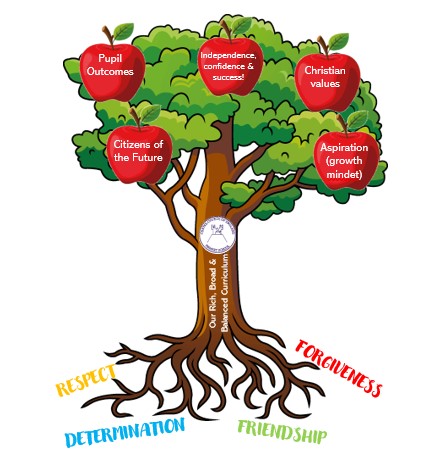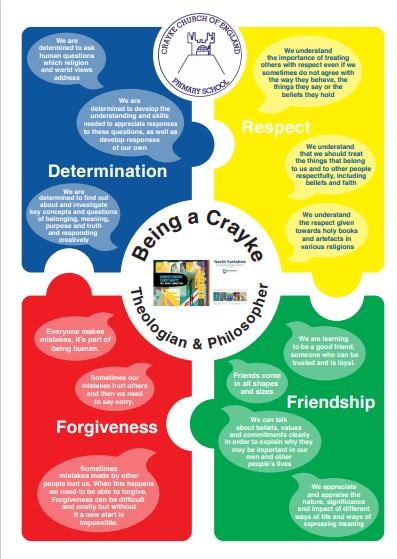
This page provides details about what RE looks like at Crayke Primary. It includes our Intent Statement, our coverage and progression document and our “jigsaw” explaining how teaching and learning in RE links to our four core values of Friendship, Forgiveness, Respect and Determination.
The RE Subject Leader is: Mrs Chandler.

Ensuring access to a rich, broad and balanced curriculum, based upon and framed by our school values of Respect, Determination, Friendship and Forgiveness, is at the heart of Crayke’s provision…
Rationale:
The fundamental aim of Crayke Church of England Primary School is to provide opportunities for children to develop as independent, confident, successful learners with high aspirations; creating citizens of the future who know how to make a positive contribution to their community and the wider society. This aligns with our school vision which strives to enable children to “Follow your pathway and grow together with confidence.”

RE intent:
Being a Crayke Theologian and Philosopher means that:
Religious Education contributes dynamically to children and young people’s education in schools by provoking challenging questions about meaning and purpose in life, beliefs about God, ultimate reality, issues of right and wrong and what it means to be human.
- In RE pupils learn about and from religions and worldviews in local, national and global contexts, to discover, explore and consider different answers to these questions.
- Pupils learn to weigh up the value of wisdom from different sources, to develop and express their insights in response, and to agree or disagree respectfully.
- Teaching therefore should equip pupils with systematic knowledge and understanding of a range of religions and worldviews, enabling them to develop their ideas, values and identities.
- It should develop in pupils an aptitude for dialogue, so that they can participate positively in society, with its diverse religions and worldviews.
- Pupils should gain and deploy the skills needed to understand, interpret and evaluate texts, sources of wisdom and authority and other evidence. They should learn to articulate clearly and coherently their personal beliefs, ideas, values and experiences while respecting the right of others to differ.
The purpose of RE is captured in the principal aim, which is intended to be a short-hand version for day-to-day use.
Principal aim
The principal aim of RE is to engage pupils in systematic enquiry into significant human questions which religion and worldviews address, so that they can develop the understanding and skills needed to appreciate and appraise varied responses to these questions, as well as develop responses of their own.

Meeting North Yorkshire requirements, by following the ‘North Yorkshire Agreed Syllabus for RE’ (NASRE) and ‘Understanding Christianity’ (UC) we deliver a rich, broad and balanced curriculum. Crayke engages all learning styles using a variety of resources which support the teaching of the curriculum. The wider learning culture is promoted through our school values of ‘Determination, Respect, Friendship and Forgiveness’ and through a culture of our aspirational ‘Crayke Growth Mindset’.
EYFS:
The EYFS part of the NYASRE and UC is taught in a variety of ways through adult-led and adult-supported tasks and child initiated learning in well resourced provision areas, both indoors and outdoors.
KS1 & KS2:
Using the NYASRE and UC units of work, we follow a rolling 2 year programme (Year A and Year B) This ensures that all key topics are covered and supports the progression of skills across our mixed age classes.
Where appropriate, we block learning in order to immerse children fully. Where relevant and possible, we offer enrichment activities to motivate, excite and inspire pupils in the form of ‘Stunning Starts’, ‘Marvellous Middles’ and ‘Fabulous Finishes’ – these may take the form of educational visits, visitors, theme days, achievement assemblies, exhibitions etc..
We link our teaching to key texts from the religions covered, that will enrich language and provide context to learning; this involves challenges based around an enquiry question as a starting point e.g. ‘If God is everywhere, why go to a place of worship?’ We follow our lesson structure (see attached) making connections and spotting values through our RE lessons.
Creatively produced RE books give children a sense of pride in the presentation of their work.
RE impact:
Impact will be measured by assessing formatively against the NYASRE and UC assessment statements through ‘Insight pupil tracking’ at termly intervals as:
- Below
- Just below
- On track
Crayke theologians and philosophers will be able to demonstrate the essential characteristics of RE detailed in the Intent section above.
They will successfully be able to:
- Know about and understand a range of religions and worldviews1, so that they can:
- describe, explain and analyse beliefs and practices, recognising the diversity which exists within and between communities and amongst individuals
- identify, investigate and respond to questions posed, and responses, offered by some of the sources of wisdom2 found in religions and worldviews
- appreciate and appraise the nature, significance and impact of different ways of life and ways of expressing meaning.
- Express ideas and insights about the nature, significance and impact of religions and worldviews, so that they can:
- explain reasonably their ideas about how beliefs, practices and forms of expression influence individuals and communities
- express with increasing discernment their personal reflections and critical responses to questions and teachings about identity, diversity, meaning and value, including ethical issues
- appreciate and appraise varied dimensions of religion.
- Gain and deploy the skills needed to engage seriously with religions and worldviews, so that they can:
- find out about and investigate key concepts and questions of belonging, meaning, purpose and truth, responding creatively
- enquire into what enables different individuals and communities to live together respectfully for the wellbeing of all
- articulate beliefs, values and commitments clearly in order to explain why they may be important in their own and other people’s lives.
They will use the school Christian values of Respect, Determination, Friendship and Forgiveness to drive their RE attainment and show progress against the milestones alongside demonstrating aspiration, confidence, independence as they develop in to citizens of the future.







